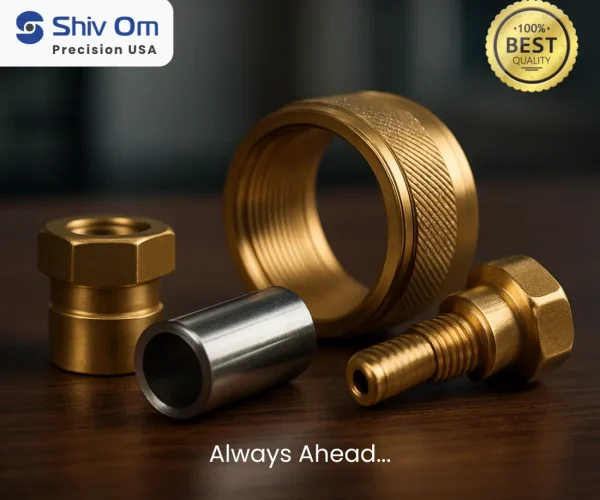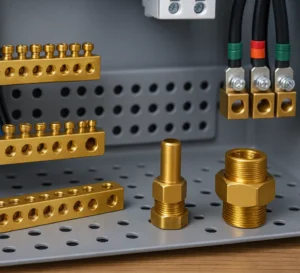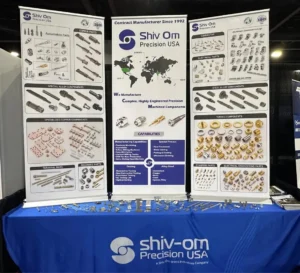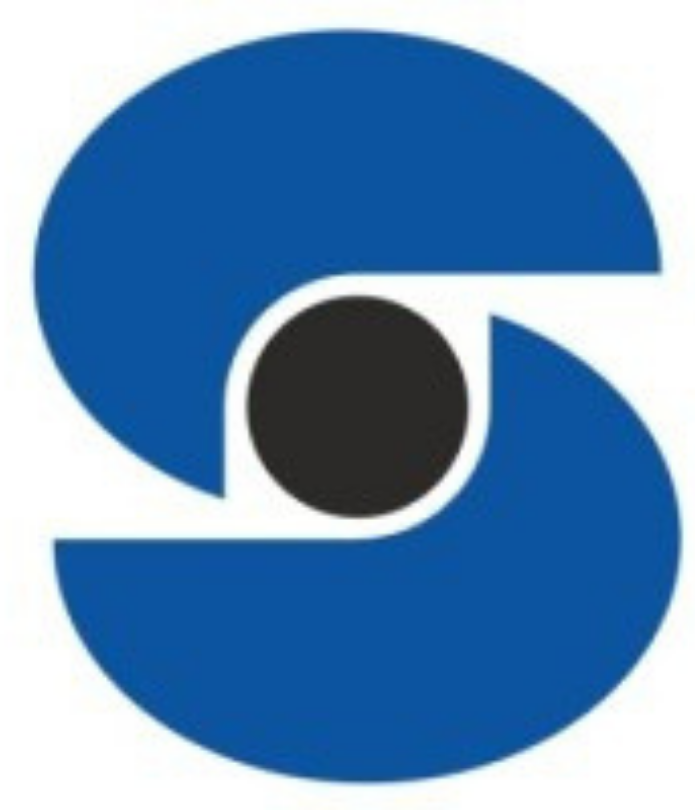Introduction

In a world where manufacturing timelines are tight, product lifecycles are shrinking, and quality demands are at an all-time high, sourcing the right precision machined parts has become a key strategic decision for global buyers.
Whether you’re in the automotive, electronics, electrical, or industrial equipment sector, machined components like brass turned parts, fasteners, and inserts play a crucial role in the performance and safety of your product. Even a micron-level deviation can impact the functionality of the final assembly — which is why quality, traceability, and supplier reliability are no longer negotiable.
With the global market for precision machining expected to reach USD 128 billion by 2028 (source: Grand View Research), more OEMs and buyers are looking to trusted suppliers in cost-effective manufacturing hubs like India. However, navigating this process — from choosing materials like brass, understanding inspection protocols, to ensuring compliance with export standards — requires more than just a purchase order.
In this blog, we explore what every global buyer should know before sourcing machined components, how to evaluate manufacturers for long-term success, and why brass machined parts remain a go-to solution for critical industries.
What Are Machined Components and Why They Matter in Global Supply Chains

Machined components refer to parts that are manufactured through precision machining processes such as turning, milling, drilling, and threading. These processes use computer-controlled machines (CNC, CAM, Swiss-type lathes, etc.) to cut, shape, and finish raw materials like brass, aluminum, stainless steel, and other alloys into parts that meet highly specific dimensional tolerances.
These components can include everything from brass terminals and electrical connectors to automotive fittings, instrumentation inserts, and fasteners. What makes them essential is their accuracy, repeatability, and ability to integrate seamlessly into larger assemblies — no matter the industry.
📦 Why They Matter in Global Supply Chains
In global manufacturing ecosystems, machined parts are often the backbone of assembly lines. For OEMs, system integrators, and B2B product manufacturers, the stakes are high — even the smallest defect or delay can disrupt production.
Here’s why precision machined components are so critical:
- ✅ Consistency & Interchangeability: High-precision tolerances ensure that each unit performs identically, allowing easy replacement, maintenance, and scalability.
- ✅ Dimensional Accuracy: Industries like aerospace, medical, and automotive require components with tolerances as tight as ±0.001 mm.
- ✅ Customization & Flexibility: Machining allows for customization based on specific drawings or standards — from a one-off prototype to mass production.
- ✅ Global Compatibility: Export-ready machined parts often comply with standards like DIN, ISO, ASTM, or JIS, making them ideal for integration across global supply chains.
In essence, machined components act as the invisible yet indispensable parts that keep systems running — from electrical panels in skyscrapers to fluid fittings in heavy vehicles.
As global operations increasingly rely on just-in-time supply chains and cross-border manufacturing, having a reliable source for these parts is no longer optional — it’s mission-critical.
Key Considerations for Importing Machined Parts Across Borders
Global buyers importing machined parts across borders, including brass machined components and turned components, should consider several key factors for success. Detailed quality documentation (e.g., PPAP, FPIR) ensures components meet all specifications and quality requirements.
Ensure compliance with international standards (ISO, DIN, ASTM) to maintain uniform quality across borders. Use secure packaging for export to protect components from damage and corrosion during transit. Finally, partner with a reliable, certified supplier with a proven track record to ensure on-time delivery of consistently high-quality machined parts.
Common Challenges Buyers Face While Sourcing Machined Components Internationally
Sourcing machined components from international suppliers can offer cost and quality advantages—but it’s not without its challenges. One major concern is inconsistent quality, especially when dealing with suppliers who lack standardized inspection protocols or quality documentation like PPAP and FPIR. Buyers may also face delays in production or shipping, often due to unclear lead times or inefficient packaging that risks damaging precision turned components in transit.
Another issue is the lack of compliance with global standards such as ISO, DIN, or ASTM, which can lead to rejected parts or operational setbacks. Miscommunication due to language barriers or vague specifications can further complicate the process. For high-performance applications, especially those using brass machined parts, these challenges can affect both cost and timeline significantly.
Choosing a supplier with strong quality systems, export experience, and proactive communication can help buyers avoid these common pitfalls and ensure smoother global procurement.
Comparing Different Materials: Why Brass Remains a Preferred Choice
When sourcing machined components for global applications, the choice of material can directly impact product performance, durability, and cost-efficiency. Among various metals available, brass continues to lead as a preferred option — especially in turned components and brass machined parts.
Here’s why brass stands out across industries
- Excellent Mechanical & Electrical Properties
- High tensile strength ensures long-lasting durability.
- Superior thermal and electrical conductivity, ideal for electrical and electronic connectors.
- Excellent corrosion resistance, even in moisture-prone or chemical environments.
- Superior Machinability & Surface Finish
- Brass is easier to cut, drill, and machine compared to harder metals like steel.
- Ideal for producing high-precision machined parts with tight tolerances and fine threads.
- Allows for clean, polished finishes without extensive post-processing.
🌍 3. Environmentally Friendly & Recyclable
- Brass is 100% recyclable without losing its original quality.
- Contributes to sustainable manufacturing by reducing material waste and energy usage.
- Supports eco-conscious sourcing for companies aiming for green certifications.
🏭 4. Wide Applications Across Industries
Brass machined parts are widely used in:
- Plumbing (valves, fittings, adapters)
- Electrical (terminals, contacts, grounding components)
- Automotive (fuel line fittings, connectors)
- Industrial machinery (threaded inserts, fasteners)
Questions Every Global Buyer Should Ask Before Finalizing a Supplier
Sourcing machined components internationally requires more than comparing quotes — it demands clear answers and accountability. Asking the right questions upfront can help avoid miscommunication, costly delays, and product mismatches.
Here are five important questions every global buyer should ask before finalizing a supplier:
🔍 Can I get dimensional & visual inspection reports?
Look for suppliers who provide FPIR (First Piece), OIR (Online Inspection), and PDIR (Pre-Dispatch) reports. These documents validate precision and surface finish of turned components before they leave the factory.
🛠️ What are your quality assurance practices and tolerances?
Ask about in-house inspection tools, control plans, and tolerance capabilities — especially for brass machined parts used in electrical or fluid systems.
📋 Can you meet my country’s compliance standards?
Suppliers should be able to align with international standards like ISO, DIN, ASTM, or RoHS — crucial for customs clearance and performance.
📦 What’s your average lead time and export packaging setup?
Clarify production timelines and how products are packed for international shipping. Moisture resistance, barcoding, and eco-friendly crates are bonuses.
📈 How scalable is your production in case of bulk orders?
Evaluate whether the manufacturer can scale without compromising quality or deadlines — especially important for long-term procurement.
Conclusion – Sourcing Smart, Sourcing Secure
Global sourcing isn’t just about finding the cheapest quote — it’s about finding a quality-driven, process-oriented partner you can count on.
The right supplier doesn’t just deliver machined parts; they deliver consistency, communication, and peace of mind. By prioritizing due diligence, checking documentation, and understanding your supplier’s capabilities, you set yourself up for a long-term sourcing relationship that adds real value.
As the demand for brass machined components and turned parts continues to grow across industries, choosing wisely today means securing supply chain stability tomorrow.
Shiv Om Precision USA - Your Reliable Partner for Precision Machined Components

Shiv Om Precision USA is a trusted exporter of high-quality brass machined components and turned parts, serving OEMs across the USA, UK, Europe, and Australia.
With process-driven manufacturing and global compliance standards, we help buyers source with confidence.
👉Get in touch to discuss your sourcing needs at here
